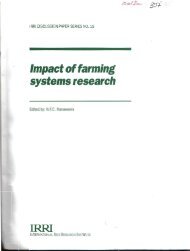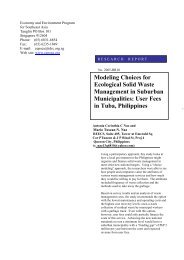Foreword - IDL-BNC @ IDRC - International Development Research ...
Foreword - IDL-BNC @ IDRC - International Development Research ...
Foreword - IDL-BNC @ IDRC - International Development Research ...
Create successful ePaper yourself
Turn your PDF publications into a flip-book with our unique Google optimized e-Paper software.
78 M. Batal et al.<br />
the season was drier than usual. Farmers also noticed that irrigated or intensifi ed<br />
practices negatively affected the taste and nutritional quality of local seeds.<br />
Although less used than in the past, local bread recipes still use different wheat, as<br />
well as barley and sorghum varieties, and remain popular and valued for reasons of<br />
health, energy, and taste. The research discovered that there was still a wide range<br />
of traditional recipes from rural areas dedicated to diverse ways of consuming<br />
local food products. These recipes showed varied practices between regions and<br />
enhanced the demand for, and cultivation of, a diversity of local landraces. By<br />
using a systemic approach, the project highlighted interrelations between the main<br />
three elements of rural food systems: traditional agricultural practices; local varieties;<br />
and traditional dishes. They are intimately connected so that the loss of any of<br />
these elements leads to the deterioration of the others, and results in environmental<br />
degradation and diet simplifi cation. Therefore, the project collected local seeds,<br />
recorded ancestral agricultural practices, and documented traditional Yemeni<br />
recipes.<br />
The research in both Lebanon and Yemen characterized complex problems in<br />
a systematic fashion. Using an ecohealth approach, the complexity of the links at<br />
different scales and levels was better understood. Both projects showed how ecosystem<br />
health and human heath are interconnected. The projects demonstrated the<br />
link between nutrition and livelihoods, created stronger markets for local food,<br />
and infl uenced changes among the practices of producers and consumers. These<br />
results have the potential to encourage more sustainable agro-ecological practices<br />
and local agro-biodiversity to avoid jeopardizing the sustaining ecosystem,<br />
improve nutrition and health, and increase national food security. However, there<br />
is still scope for both projects to make the links more explicit and to produce the<br />
evidence that policymakers and other actors require to make long-lasting positive<br />
changes for the benefi t of the poor. Though strong efforts were made to seek<br />
policy attention in workshops and through policy briefs, no signifi cant policy<br />
infl uence was achieved by either project. In both countries, weak political institutions<br />
are typical. Civil strife, war, and poverty constrain governance structures in<br />
these countries from acting on evidence from research and initiating change. In<br />
both contexts, these issues challenge not only development and poverty-alleviation<br />
initiatives, but also efforts that support the sustainable and equitable use of<br />
scarce resources.<br />
For improved food security, there is a need to evaluate agricultural and trade policies<br />
and assess current subsidies on bread, including the need to examine the impact<br />
of cereal imports on health and social equity. The rich traditions, local biodiversity,<br />
and indigenous knowledge in both Lebanon and Yemen are resources for local people,<br />
and may contribute to developing strategies for food security, nutrition, and<br />
sustainable development.<br />
One issue that remains to be researched is the change in the lifestyle of rural<br />
communities. <strong>Research</strong> on lifestyles may have potentially important contributions<br />
to address health problems encountered in both countries. An ecohealth approach<br />
would help take into account the role of physical activity (work and leisure) and<br />
their relationship with both the environment and improved health for all.

















